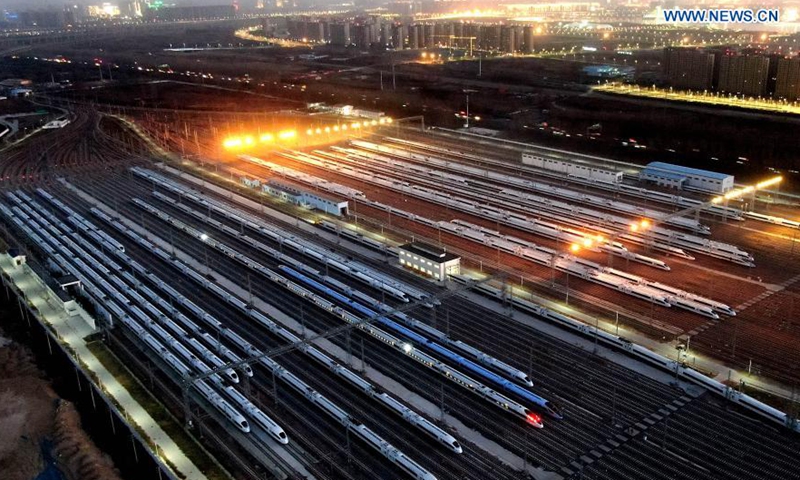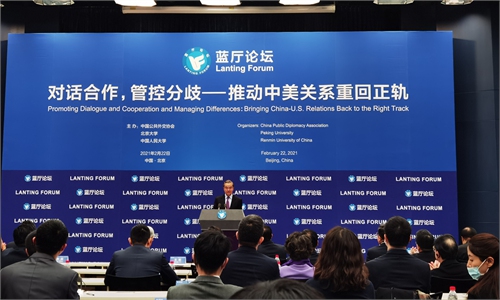Biden admin suppresses China amid its claimed 'fiercely competitive' relations; shrinking economic gap unnerves Washington
Shrinking economic gap unnerves Washington

Robots dancing at the first China-ASEAN Artificial Intelligence Summit held in Nanning, capital of South China's Guangxi Zhuang Autonomous Region on Saturday. More than 100 firms displayed cutting-edge intelligent technology and appliances for people's daily lives in the 5G era, and attendees could have a try. Photo: VCG
The recent moves by the Joe Biden administration to curb China's economic and tech rise mirrors a "mentality collapse" among US political elites, who - having identified relations with China as one of "fierce competition" - are now sparing no efforts in the "final China push" to consolidate its edge as an early starter in the world economy.
The US still enjoys an advantage over China in chips, new materials, software and operating systems, yet China has managed to bridge the gap or even surpass the US in 5G, new energy, aerospace, and even niche industries such as drones in the past decades. Such a drastically narrowing gap between the world's two largest economies has further unnerved Washington, with "China threat" rhetoric resurfacing, taking a shot at the economic sphere.
Facing a potentially white-hot rivalry, China is prepared - and has the ability too - to tackle a rules-based benign competition, observers said. But they also warned Washington to drop its inherent Western prejudice on Beijing, avoiding a vicious life-or-death struggle that could turn the world into a battleground.
US Senate Majority Leader Chuck Schumer is reportedly leading the drafting of legislation aimed at improving US competitiveness with China, including bolstering the supply of US chips. The plan also lists possible steps directed at trade with China and claims intellectual property theft, while also seeking to keep the US as the champion in sectors like AI and 5G, Bloomberg reported.
The plan, echoing a slew of moves aimed at cementing the US' leading position against the China challenge since Joe Biden was sworn into office, marks Washington's latest strategy to block China's growth in key high-tech sectors.
The White House said on Tuesday (US time) that US-China relations are one of "strong competition" and the Biden administration will take an allied approach to make sure it is coming from a position of strength. The announcement comes a day after Beijing urged Washington to stop interfering in its internal affairs and remove trade sanctions.
"There is a tone shift from the former Trump administration to Biden regarding China - from confrontation to competition, but the substance has not fundamentally changed. China's rising tech strength and greater role in the world economy has made the US uneasy, who considers China an 'imaginary enemy' that would erode its global leadership and political influence," Ma Jihua, a veteran high-tech industry analyst, told the Global Times on Wednesday.
"'When we were growing up, China was only a developing country that could not compete with the US superpower. How could the country grow in such an exponential manner?' That is a typical portrait of the bipartisan arrogance of the US political elite, how their pride is knocked down by the reality and how their great anxiety over China's rise is generated," Ma said.
Analysts noted that a fresh round of "China threat" rhetoric is building up on the political legacy of Donald Trump, and being hyped in the Biden administration.
"How China posed a major threat to the US, dating back to the Obama administration, was primarily involved on the geopolitical and military fronts in the past. But it is evolving in the economic sphere, as economic strength weighs heavily in the political arena," Ma said.
But the strategy is to boost competition rather than push forward decoupling. Hu Qimu, chief researcher at the Sinosteel Economic Research Institute, told the Global Times on Wednesday that Biden's ambition is to rely on the US' existing strong innovation capacity to expand its technological advantages and to make its industries stronger, and finally consolidate its global dominance over China.
Observers noted that Biden may downplay its ambition in low-end manufacturing but scale up efforts and unite allies in choking China in trade as well as high-end sectors like semiconductors.
Benign competition
China is quickly catching up with the world's largest economy.
In 2020, China - being the only major economy in the world to expand - recorded a GDP growth of 2.3 percent, eclipsing an estimated 4.9 percent contraction of the US economy. That would make China's GDP roughly 70.4 percent of the US, compared with only 11 percent two decades ago.
Former World Bank chief economist Justin Lin Yifu estimated in January that China will overtake the US as the world's largest economy in 2028, two years earlier than previously forecast due to the effect of COVID-19, according to media reports.
From an industry perspective, China's march into high-end manufacturing industries over the past years is unprecedented. The country has taken the lead in the global 5G push and high-speed rail technology, while making key breakthroughs in aerospace, new energy and the national defense and military industry, some of which are at par with or even better than the US progress, Chinese tech practitioners said.
Take 5G. Starting 2015, China built the world's largest 5G networks, with 5G base stations reaching 700,000 units to date, accounting for about 70 percent of the world's share. That compares with 50,000 in the US, according to data as of the end of 2020 from research firm International Business Strategies.

Photo: Courtesy of Huawei
The Global Times also learned from China's main telecom carriers that China's research and development of 6G began in 2018, which would help the country gain an early start in the global race.
But China has many shortcomings, such as new materials, biomedicine and chips. China also lags behind in soft power, such as finance and education, Hu noted.
"There are industrial gaps with the US. The gap with the US in software and semiconductors could take a decade to close," Ma noted.
"China is not afraid of competition as long as it is on an equal footing. The US may have swords, but we also have daggers," a manager of a Shenzhen-based drone maker, who prefers not to be identified, told the Global Times on Wednesday.
In the 14th Five-Year Plan (2021-25) which charted China's economic road map for the next five years, China has already prioritized self-sufficiency in technology as a major pillar for economic development.

Aerial photo taken on Jan. 28, 2021 shows bullet trains to be maintained at a maintenance base in Zhengzhou, central China's Henan Province. Zhengzhou section of China Railway Zhengzhou Bureau Group Co., Ltd. carries out maintenance work and epidemic precaution for trains to prepare for the country's annual Spring Festival travel rush.Photo:Xinhua
The manager added that benign competition between the world's two largest economies will lift Chinese tech practitioners' morality and inspire them to strive for the best, thereby injecting new dynamics to global innovation.
Fu Ying, former Chinese vice foreign minister and vice-chairperson of the Foreign Affairs Committee of the National People's Congress (China's top legislature), said at a forum on Monday that China is not afraid of competition, but the competition should not be "strategic," and needs to be healthy and virtuous.
"Competition between China and US will prevail, but the relationship is also full of cooperation opportunities. China and the US should sit together to expand such opportunities as well," Wang Peng, an associate professor at the Gaoling School of Artificial Intelligence at the Renmin University of China, told the Global Times on Wednesday.




